Catholic Social Teaching in Action: Ethical Purchasing at Catholic Institutions
BY KELLY SWAN | November 1, 2021
Maricela Lopez is deeply familiar with the ways in which workers’ rights are violated in the U.S. The memory of her dehumanizing experience of working in a chicken processing plant informs her work today—as a worker-owner and shift lead for Opportunity Threads, a worker-cooperative textile mill in Morganton, North Carolina connected to a larger ethical production initiative in the region, The Industrial Commons.
“When you’re coming from a place where your rights have been violated, as a leader you have a choice—do the same things that were done to you or do better,” Lopez says. Working with younger employees, she tells them that “you have to be responsible, fight, work hard, and not just stay where you are.”
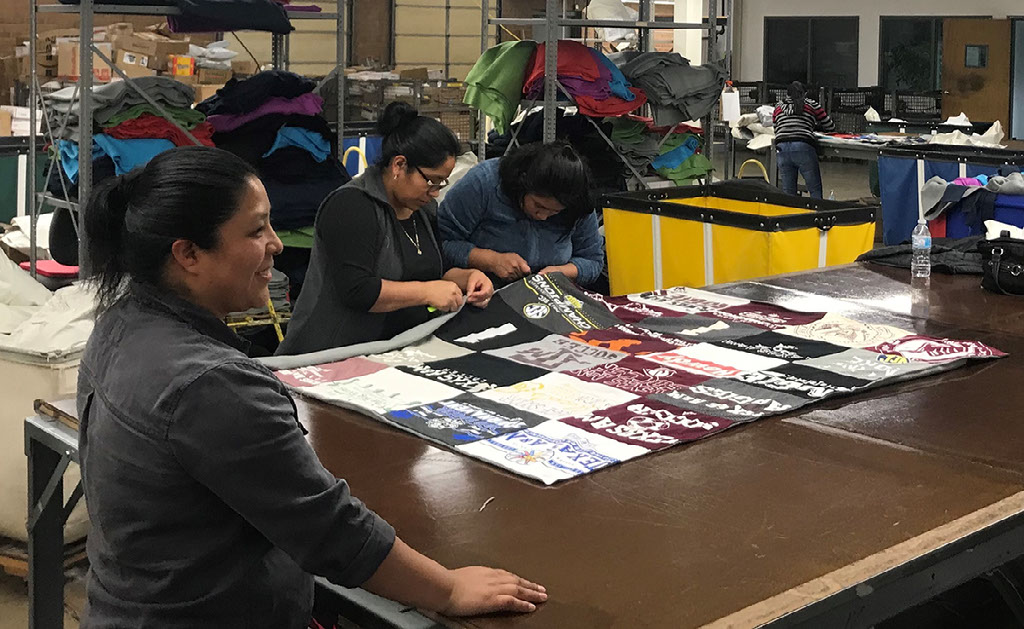
Maricela Lopez (foreground) shows off a t-shirt quilt at Opportunity Threads, an Industrial Commons worker-cooperative mill in Morganton, North Carolina
Some 500 miles away, a Catholic university is considering the same issues through a different lens—institutional purchasing. Kate Giancatarino, the director of the school’s Center for Service and Social Justice, has been integrally involved in this work. She spoke of the university’s 2013 Fair Trade Status, awarded by Fair Trade USA, as an impetus for the campus to more deeply consider the products sold and food consumed on campus, and the implications of those decisions, from both a human and ecological perspective.
Catholic Ethical Purchasing Alliance
Lopez and Giancatarino are connected to a broader movement beyond their own workplaces and communities through a new initiative—the Catholic Ethical Purchasing Alliance (CEPA).
The CEPA emerged from an ongoing partnership between the Ignatian Solidarity Network and Ethix Merch, an ethical promotional products supplier. The partnership serves a very specific purpose—to support Catholic institutions and individuals in integrating the values of Catholic Social Teaching with their purchasing practices.
CEPA Origin Story
For years, ISN’s executive director, Christopher Kerr, and Ethix Merch’s CEO, Daniel Cardozo, have been dreaming of ways to enhance the partnership between their two organizations.
Cardozo describes the starting point of this partnership as the anti-sweatshop movement of the 1990s and early 2000s, which brought attention to the exploitation of garment workers around the world. In imagining the CEPA, Cardozo and Kerr together took stock of the initial movement’s success and failures. They noted that previous efforts within this movement often were too narrowly focused on individual purchasing decisions—or too broadly focused on large governmental or institutional purchasing. The CEPA takes a third path, focusing on leveraging purchasing power with a specific population—in this case, Catholic institutions and individuals—to build a model and a supply chain that can be replicated and utilized to wield enough influence to change corporate behaviors.
The Catholic Case for Ethical Purchasing
The concept of ethical production and purchasing has deep roots in Catholic Social Teaching and tradition. The church teaches that “the economy must serve people, not the other way around. Work is more than a way to make a living; it is a form of continuing participation in God’s creation. If the dignity of work is to be protected, then the basic rights of workers must be respected—the right to productive work, to decent and fair wages, to the organization and joining of unions, to private property, and to economic initiative.”
This leads to the second priority of the CEPA—bringing light to the ecological impact of consumption and purchasing as it connects to Catholic beliefs and the imperative to protect the inherent dignity of all people—and the planet.
In his landmark 2015 encyclical on the environment, Laudato si’, Pope Francis wrote that “work should be the setting for this rich personal growth, where many aspects of life enter into play: creativity, planning for the future, developing our talents, living out our values, relating to others, giving glory to God.”
Looking back, Pope John Paul II emphasized the importance of the interconnectedness of the environment and ethical purchasing and production in his 1991 encyclical, Centesimus Annus, writing, “Equally worrying is the ecological question which accompanies the problem of consumerism and which is closely connected to it. In his desire to have and to enjoy rather than to be and to grow, man consumes the resources of the earth and his own life in an excessive and disordered way.”
Walking the walk: Catholic Ethical Purchasing in Action
Kate Giancatarino is an inaugural member of the CEPA working group. Her work at Villanova has centered on these ties between worker’s rights, ecology, and ethical purchasing and consumption. “Throughout the university, education is happening on the principles of Catholic Social Teaching, with the hopes of going beyond theory to practice—hoping that the university embodies the meaning beyond the words. Specifically, we are working with student leaders who are engaged in labor activism and social actions who are invested in seeing fair labor increased throughout the University, including in our purchasing.”
The CEPA’s work going toward is designed to support these very efforts at Catholic institutions across the country. In August of 2021, ISN and Ethix hosted a day-long workshop for faculty, staff, and students at Catholic universities titled Working Together: Building a Catholic Campus Culture of Ethical Consumerism, from which the CEPA has quickly grown.
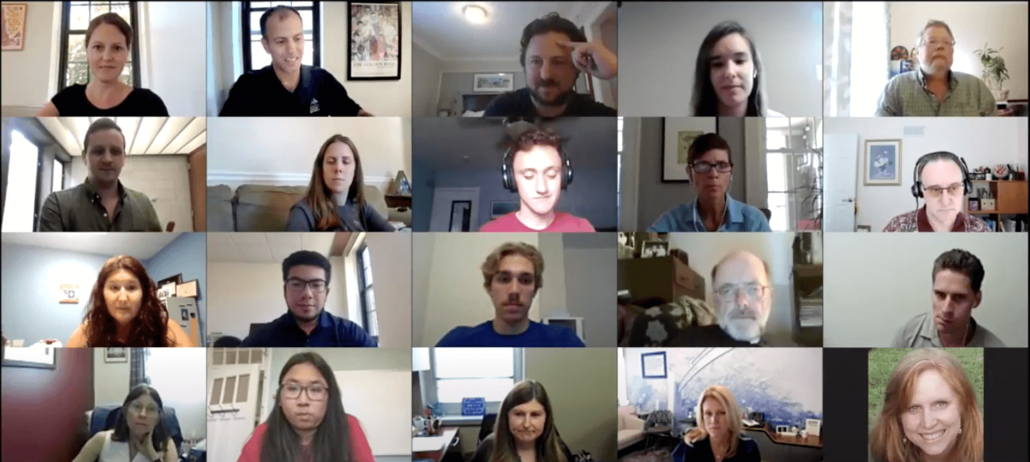
Working Together: Building a Catholic Campus Culture of Ethical Consumerism attendees and facilitators, including (top row, from left) Julie Myers, Christopher Kerr, and Daniel Cardozo, and Matt Cuff (second row, left).
Julie Myers, recently hired as ISN’s ethical purchasing coordinator, is working closely with Cardozo and Kerr to develop CEPA goals and programming. Myers has been engaged in this work for years, connected to her prior role coordinating immersions and ethical purchasing as a campus minister at John Carroll University. She is joined by Matt Cuff, whose graduate program at the Boston College School of Theology and Ministry funds active involvement in outside projects, brings a rich lineup of network connections from his years working for the Jesuit Conference’s Office of Justice and Ecology.
Myers is working closely with a few key universities, including Villanova and John Carroll University, as the CEPA works to build a sustainable ethical purchasing model for Catholic universities. She has built a working group of staff and faculty from Jesuit institutions to provide feedback and input on planning, build resources, facilitate student connections, and provide context for their individual campuses.
Student involvement and energy around ethical purchasing is vital, but their time on campus is limited, and Myers is working to make consistent key faculty and staff points of connection to do the long-term work of getting ethically produced items into campus bookstores, enact campus policy changes, and to acquire the proper licensing for college logo apparel—this all with the goal of individual campuses sustaining this commitment even when a key leader in that community steps away.
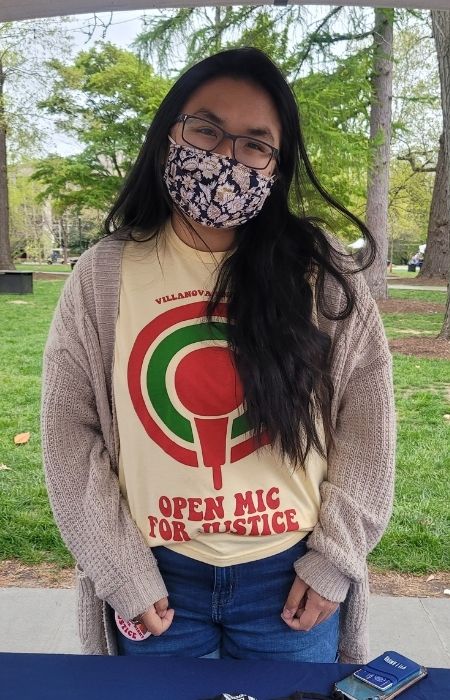
Cathy Nguyen, a member of the Villanova class of ’23 and a peace and justice major, wears a COLLECTION brand t-shirt designed for a campus ministry event celebrating Earth Week on campus.
Cardozo points to specific CEPA goals—that within two years, 51% of Jesuit universities and highs schools will become CEPA members, a distinction in development that will include goal setting and action steps at the institutional level. Furthermore, the CEPA aims to include 51% of all Catholic universities and high schools as members within 5 years. “That 51% answers the question—have you developed a model that shows that an entire community or network can change their purchasing behaviors? This number shows us that our work is supporting a majority of Catholic education institutions in learning, organizing, and making a commitment to ethical purchasing.
Closing the Circle: Catholic Institutions and the Carolina Textile District
During the current academic year, John Carroll University will be piloting an immersion program to North Carolina to see firsthand the work of The Industrial Commons, specifically COLLECTION, a brand of ethically produced textiles key to Ethix and ISN’s partnership. While there, JCU students will have the opportunity to see firsthand the impact that ethical production and purchasing can have on individual lives and on the environment—an experience designed to be replicated for other schools, like Villanova.
Of this growing partnership, Sara Chester, co-executive director of The Industrial Commons, says that “Partnering with CEPA will be so helpful to COLLECTION and our alliance of manufacturers as they can be a voice to share with the world the beautiful products being made and the good work happening here in North Carolina.”
ISN’s executive director, Chris Kerr, agrees. “Partnerships with worker-led initiatives like the Industrial Commons is a unique opportunity for Catholic institutions to put into practice the commitment to sustainability, economic justice, and workers rights.”
Kelly Swan has worked for the Ignatian Solidarity Network since 2016, first as communications director, and now as director of advancement. She grew up in West Virginia and is a graduate of Wheeling Jesuit University. Kelly has worked in parish social ministry, child and family advocacy, community education and organizing, and publishing. She lives in the Cleveland, Ohio area with her children.

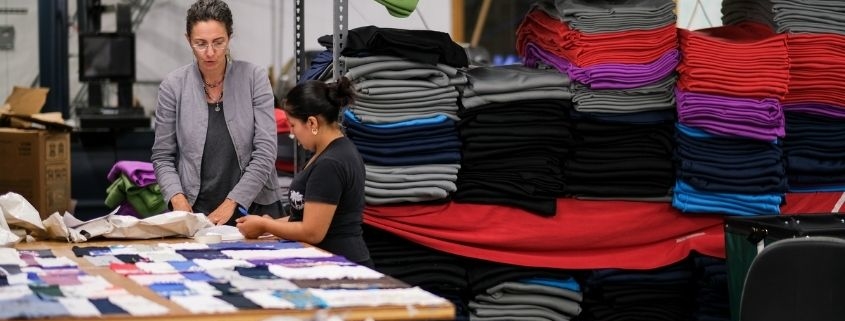





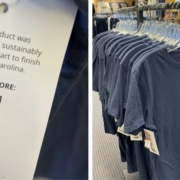
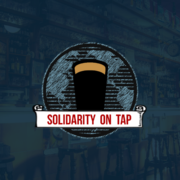
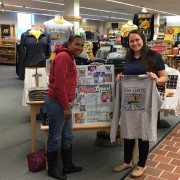
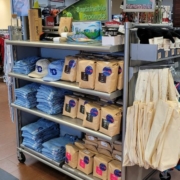


The principle of Tantum Quantum still holds good. Ethical purchasing needs to be our way of proceeding. Thus wrote Mahatma Gandhi: Nature produces sufficient for everyone’s need but not enough for everyone’s greed.